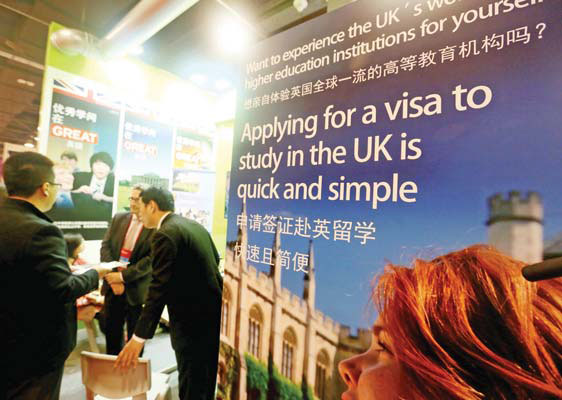Consultancy woes hurt Chinese students

Case of graduates told to leave UK points to problems with some organizations providing sponsorship or advice
A British consultancy had its liscence suspended, which led to 257 Chinese graduates being told to leave the country within 60 days, highlighting increasing problems with immigration consultancies harming the interests of Chinese graduates.
In June, the Overseas Student Service Centre had its Tier 5 sponsorship license revoked by the Home Office. The 257 Chinese students sponsored by the company were given 60 days to leave or make alternative arrangements.
| Students and Parents seek advice from consultancies in an international education expo in Bejing. Provided to China Daily |
"The compliance checks made in respect to the Overseas Student Service Centre found significant breaches of those obligations and its license has been revoked as a consequence," according to a Home Office spokesman.
The Home Office confirmed that the move is unrelated to Brexit, and not part of the UK's general immigration strategy. Other Tier 5 immigration programs run by approved organizations are unaffected.
The company's Tier 5 scheme, called International Student Internship Program, worked by sponsoring the internship visas of eligible graduates who manage to find internships at British organizations. The consultancy charged each student 1,200 pounds ($1,550; 1,402 euros). It was run in partnership with law firm Denning Legal.
Previously, students in the Tier 5 government authorized exchange program found internships at many big firms like UBS bank, Taylor Wessing law firm and the Intercontinental Group hotel chain.
Colin Chen, managing director of the internship program, says there are two major reasons the program was accused of noncompliance.
"Firstly because our program is designed to encourage students to help their interning companies develop business relationships in China, the Home Office considers such a role to be beyond what an intern is expected to do and these interns' tasks are impacting on the local job market," Chen says.
"Second, the Home Office immigration rule requires us as the sponsoring company to keep a strict record of the interns' attendance, salary and nature of their work, but such rules are impractical as these interns do not work directly for us."
Denning Legal had no immediate comment.
The Overseas Student Service Centre has sent an email to all affected Chinese students, saying that its scheme had been halted by the UK Visas and Immigration service because of its impact on the UK labor market, and the challenge of monitoring the students and their employers by the sponsoring organization.
The company is not eligible to re-apply for a new license for 12 months from the date their license was revoked, according to the Home Office.
The case highlights the trend of a growing number of problems with agents working in the immigration field.
Chinese student numbers in the UK are growing rapidly. But Chinese graduate students' ability to stay in the country has become increasingly difficult after the UK abolished the post-study work visa in 2012. In the 2014-15 academic year, the number of Chinese students exceeded any other nationality, with 89,540 enrolled in higher education. Under the previous visa program, students could stay after graduation to gain work experience for two years.
Zhang Xueying, head of the China and Far East desk at Sherrards Solicitors, says the number of immigration agencies focusing on the Chinese graduates' market has grown rapidly. She says it was not uncommon for Chinese students to either have their visa applications rejected, or be banned from entry into the UK for a certain period due to unprofessional practices by the immigration agents they use.
Some immigration agents may put wrong or fraudulent information on application forms, and when the Home Office discovers the problem, they hold the applicant responsible.
"One major issue ... is the lack of regulation for internet-based Chinese language content. Some immigration agents call themselves immigration lawyers in Chinese on the internet to attract clients, when in fact they are not qualified lawyers registered with The Law Society (in the UK)," says Zhang.
"There are certain tasks only registered and recognized UK lawyers can do, but these immigration agents carry out these tasks for their clients anyway."
cecily.liu@mail.chinadailyuk.com
(China Daily European Weekly 07/08/2016 page2)
Today's Top News
- Takaichi must stop rubbing salt in wounds, retract Taiwan remarks
- Millions vie for civil service jobs
- Chinese landmark trade corridor handles over 5m TEUs
- China holds first national civil service exam since raising eligibility age cap
- Xi's article on CPC self-reform to be published
- Xi stresses improving long-term mechanisms for cyberspace governance































